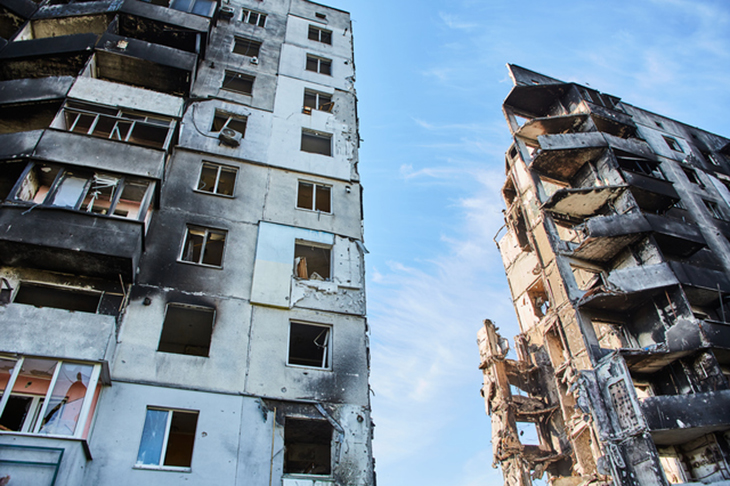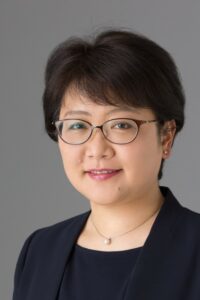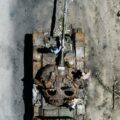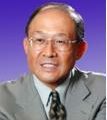A World On the Brink: The Conditions for Rebuilding the Postwar Order: A Strategy of Linking NATO and the Indo-Pacific Order

Borodianka, Ukraine, May 28, 2022: Houses destroyed.
Photo: sarymsakov / PIXTA
How can we revive the post-WWII international order that has been damaged by Putin’s war? I believe now is the time to envision a new postwar order. The proactiveness and creativity of Japanese diplomacy will be tested as we head toward the construction of a security framework that links NATO and the Free and Open Indo-Pacific (FOIP) as well as a platform for highly effective disarmament and arms control.
Iwama Yoko, Professor, National Graduate Institute for Policy Studies (GRIPS)

Prof. Iwama Yoko
The world is always full of injustice and destruction, so simply perpetrating unlawful violence is not in itself enough to destroy the social order. Unless the act presents a fundamental challenge to the institutions that maintain the order, the basic order is maintained regardless of the amount of violence. Putin’s war has been going on for quite some time now, but why does it feel like this war is shaking the international community to this extent?
What the “Ukraine War” has destroyed
Putin’s actions challenge and destroy the institutions that maintain the international order in at least four ways:
(1) 20th Century International Law identifies war as an illicit means of resolving international disputes, except in the case of self-defense. Even if Putin feels that the North Atlantic Treaty Organization’s (NATO)’s eastward expansion in the Post-Cold War era is horribly unjustified, it cannot in itself justify an attempt to restore the status quo ante by use of force. The current United Nations system has this as a basic principle, and Russia ought to support this as a permanent member of the Security Council.
The only exception to the principle of the illegality of war is war in self-defense, which is recognized in Article 51 of the Charter of the United Nations. Both individuals and states have the right to risk their lives to fight for what they value, and to deny even that right is to deny the view that humans are creatures capable of value judgments. Therefore, any argument seeking to force peace on Ukraine denies the state’s right of self-defense as well as the humanity of individuals.
On the other hand, it is almost impossible for Russia to claim this war as a matter of self-defense, so it is an illegal war no matter how you think about it. To call this act of aggression some kind of military operation other than war is mere sophistry.
(2) In Europe since the 1970s, despite ideological antagonism between east and west, there was a growing recognition that avoiding all-out nuclear war was a common interest of mankind which constitutes “common security,” with efforts being made to build a new security system. Efforts were made to reduce the risk of nuclear war through détente and to build a pan-European security system.
Germany’s continued purchase of Russian natural gas and its continued efforts to show understanding of Russian security demands is an extension of this worldview. This diplomacy began with the Willy Brandt administration of the West German Social Democratic Party (SPD), and as an SPD member from the traditional SPD stronghold of Hamburg, Prime Minister Olaf Scholz inherits that tradition. The Conference on Security and Co-operation in Europe (CSCE) and the Helsinki process, which began in 1975, have been important pillars of East-West common security. Its successor, the Organization for Security and Co-operation in Europe (OSCE), has continued to play a low-key but important role as a comprehensive security organization since the end of the Cold War.
If Putin wanted to object to NATO’s expansion after the Cold War while maintaining a certain level of cooperation within Europe, he should at least have continued to respect the value of the OSCE. However, Putin started this war by trampling on the Minsk peace process (Minsk agreements), of which the OSCE had been an important player. Moreover, he is destroying the peaceful foundation of interdependence by using energy and especially natural gas as a means of intimidation.
(3) Russia’s acts of war ignore the international law of war, which is an important component of modern international law. War is not mere violence; it is an institution of the international community because it is an activity that takes place within certain rules. The term “international humanitarian law” is more contemporary, but the treatment of noncombatants, the treatment of prisoners of war, and the many regulations on the means and methods of conducting military operations are essential elements for war to be a rule-governed act of states. Putin’s actions constitute a step backward into the world prior to modern international law.
(4) The possibility of the use of chemical weapons has been raised in the course of the war, and at the same time, Putin himself has repeatedly threatened the use of nuclear weapons. This, too, challenges the nuclear order that has been in place for half a century. In my book Kaku no 1968 nen taisei to Nishi-Doitsu (The 1968 Global Nuclear Order and West Germany), what I refer to as the “1968 Global Nuclear Order” assigns special responsibilities to the nuclear-weapon states and especially to the United States and Russia as the two superpowers.
With the Treaty on the Non-Proliferation of Nuclear Weapons (NPT) and its ancillary institutions, the international community has put into place numerous norms to ensure that the number of nuclear-weapon states will not increase. In exchange for non-nuclear-weapon states renouncing the possession of nuclear weapons, they have been granted peaceful use of nuclear power, while arrangements were made so that their security could be safeguarded without resorting to nuclear weapons. Security assurances provided by the two superpowers to their allies, including so-called extended deterrence, was part of these arrangements. It was also as part of these arrangements that nuclear-weapon states do not use or threaten use of nuclear weapons against non-nuclear-weapon states.
After the Cuban Missile Crisis in 1963, there was an understanding between the United States and Russia that nuclear war was in nobody’s interest and that it was desirable for the number of nuclear-weapon states not to increase in order to avoid nuclear war. Putin’s threats to use nuclear weapons against Ukraine shatter that common understanding and are in direct opposition to the international community’s unceasing efforts to keep the number of nuclear-weapon states from growing.
We are no longer in the “post-Cold War Era”
For all the points mentioned above, Putin’s war is a challenge to the existing international order. But that is nothing new. Of course, the Russian invasion of Ukraine differs from previous wars by Putin both in scale and in that it is directly adjacent to NATO territory. But what is even more different is that the international community has already fundamentally been in a transition stage for several years because of the challenge posed by China. The Russian challenge takes on a different meaning in that context.
China has continuously tolerated and at times defended Russian actions subverting the principles of the existing international order. The institutions of the international community favor those in power, but abruptly overturning them is also costly for those who challenge the order as it greatly reduces predictability and carries the risk of provoking world war. Responding with incremental reforms would be much less costly. This time, however, China has refused to be taken in by the existing order as a proponent of reform and is defending Russia as it disrupts the order.
There is certainly an aspect of this war that we may term “a delayed end to the Cold War.” But even if Putin’s own motive was to defy the collapse of the Soviet empire, the implications of his actions are quite different now that American leadership in the world is much weaker than it was in 1990. We are no longer at the end of the Cold War nor in the post-Cold War era, but in an unstable transition period following the era of US hegemony.
Accelerate the institutionalization of NATO = Indo-Pacific cooperation
With respect to Western security, there is much discussion about whether to perceive Russia and China as a single threat and whether the United States should (or should not) concentrate its efforts on Europe or on Asia. Whether Russia and China are a united threat or not, we have no choice but to deal with them now. Whilst doing so, it is crucial that allies in Europe and the Indo-Pacific work together more than ever before to increase the overall power of the West. As such, discussions about to which side the United States should pivot are quite futile. As long as the two theaters are considered separately, the discussions will be zero-sum. We need to think in a way that turns it into a plus-sum game.
Since World War II, the United States has covered the roles of Japan and Germany, the two countries in Asia and Europe that should have shouldered responsibilities commensurate with their national power in terms of both economy and security. As a result of the Ukraine war, these two countries will inevitably be pushed to the forefront in terms of security. Without Japan and Germany playing a bigger role, it is impossible for the United States to continue playing a role on both fronts simultaneously.
Back in the 1930s, these two countries went their own way, which brought the greatest calamity to the world. At the time, the world was in the midst of a hegemonic shift from Britain to the United States, and during that Twenty Years’ Crisis, Japan and Germany, both challengers to the order, made world war inevitable. In order to survive the new Twenty Years’ Crisis that is beginning now without risking a world war, it is essential that the deterrence capabilities of the United States and its allies remain firmly effective.
Deepening the cooperation amongst the liberal states in Asia and Europe will require a system that facilitates closer cooperation between NATO and its key Indo-Pacific partners, namely Japan, Korea, Australia and New Zealand. These partner countries are also expected to attend the 2022 Madrid NATO Summit at the end of June, so why not propose the establishment of a NATO Indo-Pacific Cooperation Council (NAICC)?
In December 1991, shortly after the end of the Cold War, the North Atlantic Cooperation Council (NACC) was created to build a partnership between NATO and the former Warsaw Pact countries. Following suit, this time we should institutionalize a forum for cooperation with Indo-Pacific countries. Ad hoc consultations have been ongoing in the past, but by institutionalizing them, we can upgrade the cooperation to something even closer and more substantive.
In NAICC, the free world should consider the capabilities they need for their defense as a whole, consider effective capacity-building programs and capacity management, and build partnerships to ensure that the necessary capabilities are provided where they are needed in times of crisis. The immediate challenge will be to learn lessons from the Ukraine war together and to build partnerships in areas such as missile defense, information sharing, cyber defense, and space.
Toward the establishment of a global arms control system
Security requires a boosting of defense capabilities as well as keeping the way for dialogues open, for a distant future when agreements can be reached. The defense collaboration of the West may seem like a kind of siege to the Russians and the Chinese. In addition, we are entering an era of high-intensity warfare and many countries will have to increase defense spending.
Therefore, it must be made clear that all these measures are self-defensive measures with no intentions other than for defense, that war is in no one’s interest, and that there is a readiness to move toward global arms control and disarmament, including China and Russia, whenever possible. In parallel with the establishment of NAICC, we should also be proposing global intermediate-range missile disarmament. I wish to call this the “Global Double-Track Proposal.”
In the late 1970s, while the Soviet Union deployed a large number of intermediate-range ballistic missile SS-20s, NATO proposed disarmament negotiations for intermediate-range missiles as well as decided on the deployment of intermediate-range missiles to Europe in case the former negotiations failed. This was called the NATO Double-Track Decision of December 1979. This time, we should follow suit and make decisions that link disarmament and arms control proposals with large-scale missile deployments.
However, both the Soviet Union’s SS20s and NATO’s Pershing II medium-range ballistic missiles and Ground Launched Cruise Missiles (GLCMs), had nuclear warheads. In contrast, the missiles that the West is reinforcing this time should have conventional warheads. Hope for nuclear disarmament and ultimate abolition of nuclear weapons is an agenda common to the foreign policy of both Japan and Germany. Disarmament efforts are necessary in terms of maintaining the global nuclear order in place since 1968, and any further increase in ground-based nuclear weapons will in no way enhance security.
One lesson the war in Ukraine has taught us is that both missiles and missile defense require large-scale precision-guided weapons systems. Our allies have to consider the best possible choices with regard to both performance and costs. I have discussed the urgent need to improve long-range striking power in East Asia, where China stands out in terms of intermediate-range missile force, in a different article (Thinking about Deterrence for Japan and Stability in Asia, PHP Institute). Now that the Ukraine war has occurred, there is an urgent need for increased missile defense and strike capabilities in the European theater as well.
While implementing this, what role the nuclear weapons should play will definitely come up for discussion. Ground-based tactical nuclear weapons, which are designed to be used at close range, are by no means easy to use. That having a large number of ground-based tactical nuclear weapons on your own territory is a nightmare for the defenders was made painfully clear to West Germany during the Cold War. There is no need to repeat that mistake. Nuclear deterrence is necessary, but given the current technological and strategical situation, we can basically handle the task by reorganizing the US nuclear deterrent and having closer cooperation amongst allies. We should show that the West’s military buildup is one in pursuit of peace by enhancing our non-nuclear defenses and submitting the Global Double-Track Proposal.
Is there an order beyond hegemony?
Robert O. Keohane wrote After Hegemony: Cooperation and Discord in the World Political Economy in 1984. At the time, Keohane was exploring how the world might develop after the end of US hegemony. Nearly 40 years have passed since then. We cannot predict whether the next hegemon will be China, India, or the United States once again. Yet it is in the interests of humanity to stably manage the transition stage. To that end, it is crucial what role the West will play in the coming years and decades.
In this, we must be aware that the West that exists today will gradually become smaller and smaller in proportion to the world as a whole. The European age in world history is coming to an end. It should nevertheless be possible to pass on the beneficial aspects of the institutions created during the European age.
The people of Asian and African countries, who will become the protagonists of future world history, have yet to find a clear sense of direction. What model they want to build their future on will greatly change the future of mankind. In order to persuade them that the current institutions of the free world will be useful in their future, we must first begin by reforming our societies. This is no different from the fact that the victory over communist countries during the Cold War was won not primarily by military means but by the vitality and the wellbeing of the free societies.
When George F. Kennan (1904–2005) wrote the Long Telegram and the X article, he argued that the most important thing was to keep our societies healthy and prosperous. That still rings true today more than ever.
Translated from “Tokushu ‘Setogiwa’ ni chokumensuru Sekai: ‘Sengo’ chitsujo Saikochiku no Joken—Rendosuru NATO=Indo Taiheiyo chitsujo heno senryaku” (A World On the Brink: The Conditions for Rebuilding the Postwar Order: A Strategy of Linking NATO and the Indo-Pacific Order), Gaiko (Diplomacy), Vol. 73 May/Jun. 2022, pp. 6–13. (Courtesy of Toshi Shuppan) [September 2022]
Keywords
- Iwama Yoko
- National Graduate Institute for Policy Studies (GRIPS)
- international order
- postwar order
- post-Cold War
- NATO
- Free and Open Indo-Pacific (FOIP)
- Russia
- Ukraine War
- international law
- nuclear war
- nuclear weapons
- intermediate-range missiles
- disarmament
- deterrence
- 1968 Global Nuclear Order
- hegemony
- NATO Indo-Pacific Cooperation Council (NAICC)




